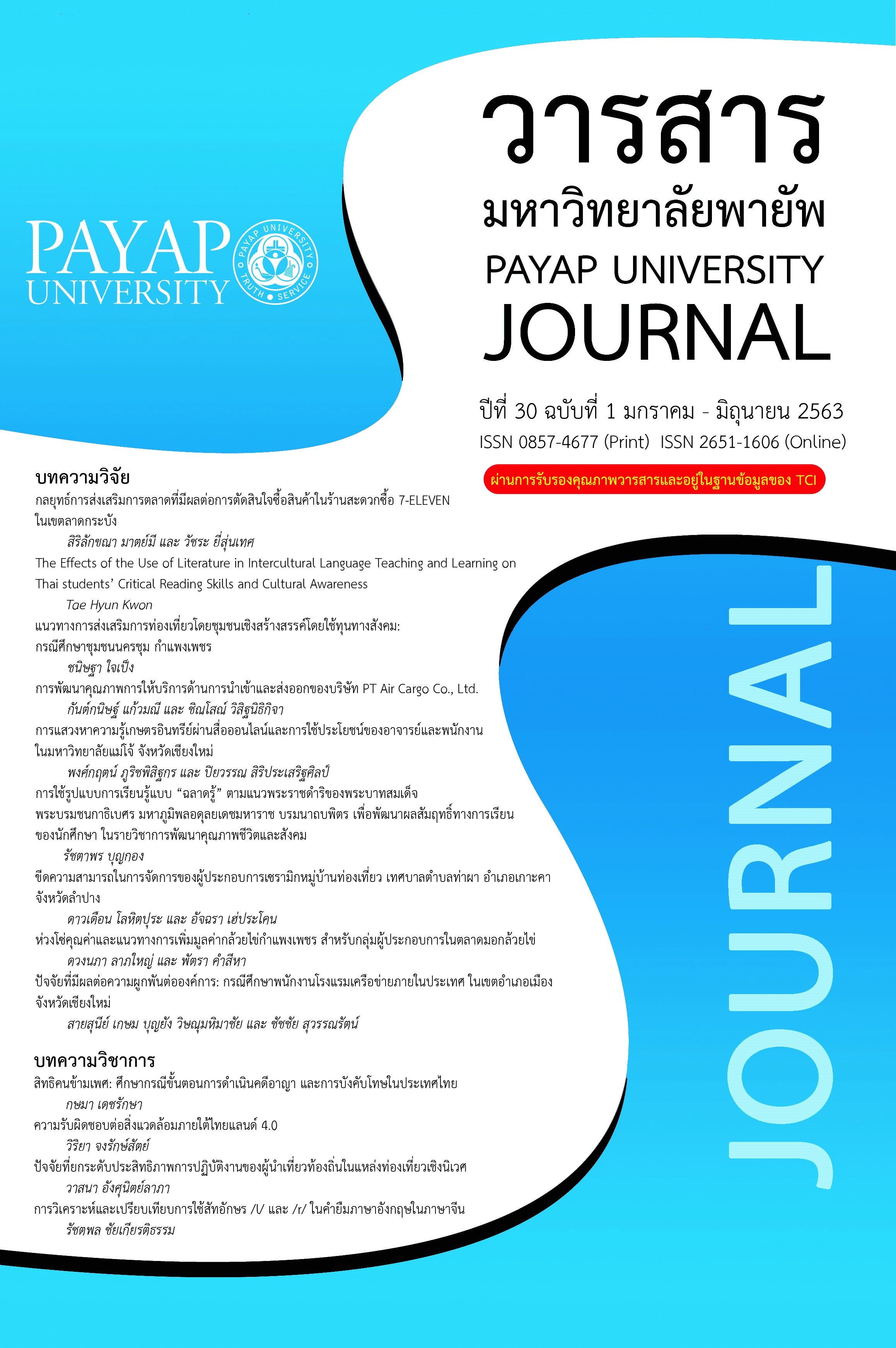ปัจจัยที่ยกระดับประสิทธิภาพการปฏิบัติงานของผู้นำเที่ยวท้องถิ่น ในแหล่งท่องเที่ยวเชิงนิเวศ
Main Article Content
บทคัดย่อ
การปฏิบัติงานของผู้นำเที่ยวท้องถิ่นในแหล่งท่องเที่ยวเชิงนิเวศ มีความสำคัญอย่างยิ่งในการสร้างมาตรฐานด้านการบริการให้เป็นที่ยอมรับ และทำให้การท่องเที่ยวได้มีส่วนช่วยดูแลรักษาแหล่งท่องเที่ยวเชิงนิเวศให้มีความสมดุลและความยั่งยืน บทความเรื่องนี้ มีวัตถุประสงค์เพื่อเสนอประเด็นสำคัญเกี่ยวกับปัจจัยที่สามารถยกระดับประสิทธิภาพในการปฏิบัติงานนำเที่ยวในแหล่งท่องเที่ยวเชิงนิเวศ สำหรับผู้นำเที่ยวท้องถิ่นที่ได้รับการฝึกอบรมด้านการท่องเที่ยวเชิงนิเวศ และปัจจัยต่าง ๆ ดังกล่าวสามารถนำไปใช้ในการประเมินผลการปฏิบัติงานของผู้นำเที่ยวท้องถิ่น ให้สามารถดำเนินงานได้อย่างมีประสิทธิภาพ การท่องเที่ยวเชิงนิเวศ จำเป็นต้องมีการสร้างสมดุลระหว่างการอนุรักษ์และรักษาวิถีชีวิตของชุมชนท้องถิ่น โดยตระหนักถึงความยั่งยืนของสิ่งแวดล้อม สังคม และวัฒนธรรม ควบคู่ไปกับการท่องเที่ยวเชิงนิเวศ โดยผ่านผู้นำเที่ยวท้องถิ่น ซึ่งเป็นผู้ที่มีความใกล้ชิดระหว่างนักท่องเที่ยวและแหล่งท่องเที่ยวในพื้นที่มากที่สุด
นอกจากนี้ สิ่งสำคัญที่ต้องคำนึงถึง คือ คุณภาพของแหล่งท่องเที่ยวและคุณภาพประสบการณ์ที่นักท่องเที่ยวจะได้รับจากกิจกรรมนำเที่ยว ดังนั้น จึงมีปัจจัยหลายประการ ที่จะช่วยให้การปฏิบัติงานของผู้นำเที่ยวท้องถิ่นมีประสิทธิภาพและประสบความสำเร็จในการปฏิบัติงานอย่างสูงสุด ได้แก่ 1) การปฏิบัติงานตามหน้าที่และความรับผิดชอบ 2) การให้ความรู้และการสร้างจิตสำนึกในการอนุรักษ์
3) คุณลักษณะพื้นฐานและจรรยาบรรณของผู้นำเที่ยวท้องถิ่น 4) การเป็นผู้นำให้เกิดการปฏิบัติตนอย่างถูกต้อง 5) การดูแลสวัสดิภาพและความปลอดภัย และ 6) การรวมกลุ่มบริหารจัดการผู้นำเที่ยวท้องถิ่นอย่างมีส่วนร่วมและการกระจายผลประโยชน์อย่างเป็นธรรม นอกจากนี้ การนำปัจจัยดังกล่าวไปประยุกต์ใช้ในการติดตามประเมินผลการปฏิบัติงาน ยังช่วยให้ทราบถึงผลกระทบที่อาจจะเกิดขึ้นในแหล่งท่องเที่ยวเชิงนิเวศ และมีการรับมือกับปัญหาในแหล่งท่องเที่ยวอย่างถูกวิธีอีกด้วย
Article Details
เอกสารอ้างอิง
เกศิณี จุฑาวิจิตร. (2542). การสื่อสารเพื่อการพัฒนาท้องถิ่น = Communication in rural development (พิมพ์ครั้งที่ 2). นครปฐม: เพชรเกษมการพิมพ์.
ดรรชนี เอมพันธุ์. (2555). การท่องเที่ยวเชิงนิเวศ. ใน เอกสารประกอบการสอนวิชาการจัดการการท่องเที่ยวเชิงนิเวศ (น. 1-50). กรุงเทพ: คณะวนศาสตร์ มหาวิทยาลัยเกษตรศาสตร์.
ดรรชนี เอมพันธุ์ และวัชรี รวยรื่น. (2551). เปิดโลกใบใหม่ คู่มือประกอบการฝึกอบรม “ยุวอาสาสมัครนำเที่ยว”. กรุงเทพฯ: การท่องเที่ยวแห่งประเทศไทย.
นิ่มนวน ทองเสน. (2557). ปัจจัยที่ส่งผลต่อประสิทธิภาพการทำงานของพนักงานกลุ่มธุรกิจผลิตเครื่องสำอางในเขตจังหวัดปทุมธานี. การค้นคว้าอิสระปริญญามหาบัณฑิต, คณะบริหารธุรกิจ, มหาวิทยาลัยเทคโนโลยีราชมงคลธัญบุรี.
บุญเลิศ จิตตั้งวัฒนา. (2548). การวางแผนพัฒนาการเที่ยวอย่างยั่งยืน. กรุงเทพฯ: เพรส แอนด์ ดีไซน์.
บุญเลิศ จิตตั้งวัฒนา. (2549). หลักการมัคคุเทศก์. กรุงเทพฯ: เพรส แอนด์ ดีไซน์.
ประชิด สกุณะพัฒน์, วิมล จิโรจพันธุ์, และอุดม เชยกีวงศ์. (2554). การท่องเที่ยวเชิงนิเวศ (พิมพ์ครั้งที่ 2). กรุงเทพฯ: แสงดาว.
พจนานุกรมฉบับราชบัณฑิตยสถาน. (2554). ประสิทธิภาพ, สืบค้นเมื่อ 27 มกราคม 2563. http://www.royin.go.th/dictionary/
พิมพรรณ สุจารินพงค์. (2551). มัคคุเทศก์ (พิมพ์ครั้งที่ 2). กรุงเทพฯ: มหาวิทยาลัยเกษตรศาสตร์.
พระราชบัญญัติธุรกิจนำเที่ยวและมัคคุเทศก์ พ.ศ. 2551. (2551). ราชกิจจานุเบกษา, 125 (ตอนที่ 29 ก), 1-27.
รวีวรรณ โปรยรุ่งโรจน์. (2550). มัคคุเทศก์. กรุงเทพฯ: โอเดียนสโตร์.
วรรณพร วณิชชานุกร. (2540). นิเวศน์การท่องเที่ยว: การท่องเที่ยวเชิงอนุรักษ์. กรุงเทพฯ: การท่องเที่ยวแห่งประเทศไทย.
สถาบันการท่องเที่ยวโดยชุมชน. (2555). บทบาทหน้าที่ของมัคคุเทศก์. ใน เอกสารประกอบการสัมมนาเชิงปฏิบัติการเพื่อเพิ่มขีดความสามารถในการบริหารจัดการการท่องเที่ยวโดยชุมชนอย่างยั่งยืน 27-29 มิถุนายน 2555 (น. 19-23).
สุรเชษฎ์ เชษฐมาส, นภวรรณ ฐานะกาญจน์, วันชัย อรุณประภารัตน์, สมเกียรติ สิงหวรวุฒิ, พิมพ์ลภัส
ขันหลวง, รติกร น่วมภักดี วันเพ็ญ คำหน้อย. (2545). แผนปฏิบัติการการจัดการการท่องเที่ยวเชิงนิเวศ: รายงานสรุปย่อสำหรับผู้บริหาร. กรุงเทพฯ: คณะวนศาสตร์ มหาวิทยาลัยเกษตรศาสตร์.
หทัยรัตน์ วัฒนพฤกษ์. (2545). ความรู้ความเข้าใจของมัคคุเทศก์เรื่องการท่องเที่ยวเชิงนิเวศ และการนำไปเผยแพร่แก่นักท่องเที่ยว. วิทยานิพนธ์ปริญญามหาบัณฑิต, บัณฑิตวิทยาลัย, มหาวิทยาลัยเชียงใหม่.
อลงกรณ์ มีสุทธา และสมิต สัชฌุกร. (2539). การประเมินผลการปฏิบัติงาน: แนวความคิด หลักการ วิธีการและกระบวนการ. กรุงเทพฯ: ดวงกมลสมัย.
อัจฉรา นิยม และพิชาภพ พันธุ์แพ. (2559). การศึกษาศักยภาพของมัคคุเทศก์ในจังหวัดเชียงใหม่. วารสารมหาวิทยาลัยพายัพ, 26(1), 255-276.
อำนาจ รักษาพล. (2549). การประเมินประสิทธิภาพและประสิทธิผลการจัดการการท่องเที่ยวเชิงนิเวศ โดยชุมชนเกาะยาวน้อย ตำบลเกาะยาวน้อย อำเภอเกาะยาว จังหวัดพังงา. วิทยานิพนธ์
ปริญญามหาบัณฑิต คณะวนศาสตร์ มหาวิทยาลัยเกษตรศาสตร์.
อุษาวดี พูลพิพัฒน์. (2544). การทองเที่ยวแบบยั่งยืน: กรณีศึกษาการท่องเที่ยวเชิงนิเวศโดยชุมชนในประเทศไทย. ใน การสัมมนาทางวิชาการครั้งที่ 1 (สาขาอุทยานและนันทนาการ) (น. 1-15). กรุงเทพ: คณะวนศาสตร์ มหาวิทยาลัยเกษตรศาสตร์.
Fan, Y., Das, K.V., and Chen, Q. (2011). Neighborhood green, social support, physical activity, and stress: Assessing the cumulative impact. Health & Place, 17(6), 1202-1211.
Khanal, B.R. and Babar, J.T., (2007). Community based ecotourism for sustainable tourism development in the Mekong region. Policy Brief, 25(1), 1-8.
Luck, M. (2002). Looking into the Future of Ecotourism and Sustainable Tourism. Current Issues in Tourism, 5(3), 371-385.
Lynn, N.A., & Brown, R.D. (2003). Effects of recreational use impacts on hiking experiences in natural areas. Landscape and Urban Planning, 64(1-2), 77-93.
Mager, R.F. & Beach, K.M. (1967). Developing Vocational Instruction. Belmont: Fearon Publishing.
Muhammad, M.M., Abdullah. M.A, Abdelmohsen A.N., and Mohammad. N.A. (2017). Community-based ecotourism management for sustainable development of marine protected areas in Malaysia. Ocean & Coastal Management, 136, 104-112.


